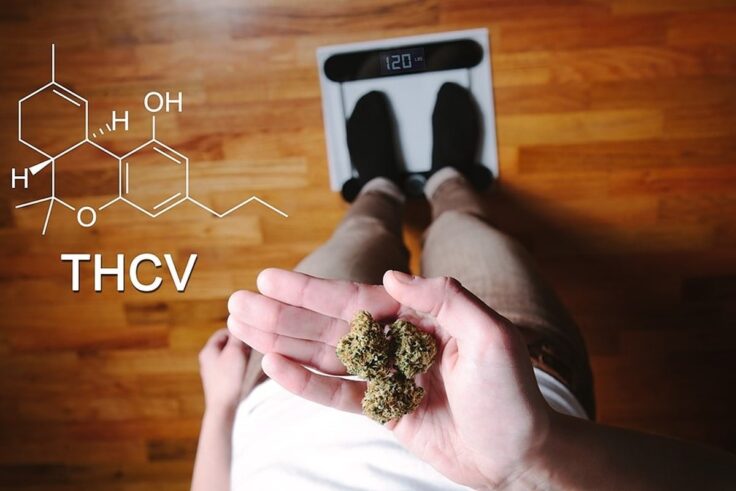THCV And Weight Loss: Here’s What We Know

Are there any cannabinoids that can aid your slimming down process? Here’s what scientific studies say about THCV and weight loss.
The cannabis plant is comprised of many different cannabinoids, the most well-known being Δ9-tetrahydrocannabinol (THC) and cannabidiol (CBD) with some others—such as delta-8 THC, CBG, CBN, and THCA—starting to break into the public consciousness.
All of these cannabinoids have been heralded for their different effects (e.g., CBN can be used for sleep).
Δ9-tetrahydrocannabivarin, also known as THCV, is a naturally occurring analog of THC, and it has been making headlines as “diet weed”.
There are claims that this cannabinoid can help with weight loss and produce focus-enhancing and energizing effects. But what have studies actually found about THCV and its potential to help with weight loss?
THCV And Weight Loss
Using a cannabis product as a weight loss aid may seem counterintuitive to many who are familiar with the popular characterization of cannabis consumption and getting “the munchies.”
To understand how THCV affects the body, it’s important to understand the endocannabinoid system (ECS), which is a key player in how the body processes and reacts to cannabis.
The ECS is made up of a large network of chemical signals and cellular receptors that can be found throughout the brain and body.
The cannabinoid receptors, such as CB1 receptors, exceed the number of many of the other receptor types in the brain. In fact, they control the levels and activity of most of the other neurotransmitters.
According to Harvard Health Publishing, the CB1 receptors within the ECS regulate functions “by immediate feedback, turning up or down the activity of whichever system needs to be adjusted, whether that is hunger, temperature, or alertness.”
The ECS regulates appetite, food consumption, and feeding behavior in both humans and animals. The use of THC is classically associated with appetite-enhancing effects.
Conversely, in a 2020 study examining THCV and its potential for the management of obesity, researchers used rimonabant, a CB1 antagonist that is similar to THCV, and observed that it demonstrated appetite-suppressing effects.
The study further stated, “In rodent studies, THCV decreases appetite, increases satiety, and up-regulates energy metabolism, making it a clinically useful remedy for weight loss and management of obesity and type 2 diabetic patients.”
Although the findings are extremely promising, more research is needed to fully explore the therapeutic potential of THCV.
Can THCV Get Me High?
Unlike THC, which is psychoactive and an agonist at the CB1 and CB2 receptors, THCV is a non-psychoactive, neutral CB1 antagonist/reverse agonist. So no, THCV will not get you high.
However, there is potential for psychoactive effects if THCV is consumed in large doses. This is very unlikely, though, since products on the market generally do not contain such high doses of THCV.
Cannabis products or strains high in THCV typically only have about 1-5% THCV, which is not enough to produce psychoactive effects.
It should be noted that consuming a THCV product in conjunction with psychoactive cannabinoids—such as THC—will produce a high. But consuming THCV in an isolated form will not.
Where Can I Buy THCV Products?
If cannabis is legal in your state, you should be able to access THCV products at your local dispensary. If you do not live close to a dispensary, don’t worry! You can also purchase THCV products online.
THCV can be found in full-spectrum hemp and cannabis products, including oils, waxes, cannabis flowers, and edibles. THCV can also be found in extracts, isolates, and distillates.
Make sure when you purchase any cannabis product that you are purchasing quality, lab-tested products.
The saturation of the market with low-quality products is a real issue. So, do your research and be sure to buy from a company that takes testing and product quality seriously.
If you’re interested in purchasing cannabis flower in particular, consider these THCV-rich strains when shopping around:
- Durban Poison – Contains ~1% THCV on average
- Jack the Ripper – Contains ~5% THCV on average
- Pink Boost Goddess – Contains ~4.24% THCV on average
- Pineapple Purps – Contains ~4% THCV on average
Final Thoughts
Cannabis is by no means a miracle drug. Yet, it is hard to dispute the mounting evidence that it has plenty of therapeutic value.
As more research is done on the Cannabis sativa plant and its cannabinoids, we will continue to learn more about their potential to alleviate symptoms of a wide variety of medical conditions and enhance daily life.